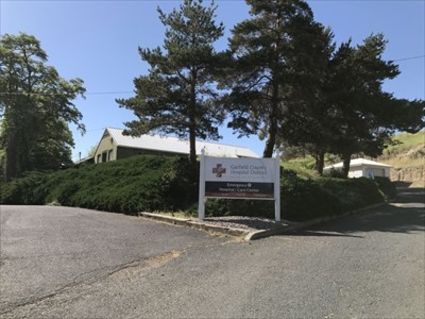Amount for April Hospital Levy set
January 2, 2020
POMEROY–A special meeting to discuss the amount of the special levy that the GCHD will run in April, 2020, was held at the Pomeroy Senior Center by the Garfield County Hospital District (GCHD) Tuesday, December 17. A presentation by Allevant Solutions, LLC was conducted via phone and a slide show.
The special levy for $860,000, will run again in April, 2020 as it did on the last ballot in November, 2019. Board member Gary Houser stated that the board needs to make it clear to the public that it won't be asking for that much every year, but that taxpayer support will continue to be a necessity.
Allevant offers consulting and training in the establishment of "post-acute transitional care utilizing the swing bed program." The model used by Allevant was developed by the Mayo Clinic and Select Medical Corp. Allevant is currently operating in 18 states and has about 70 ongoing contracts with Critical Access Hospitals. They claim that the average participating hospital sees a 49% increase in swing bed patients through their program. An example given was a hospital in Bloomer, Wisc., that was struggling financially. The hospital doubled its swing bed days through the Allevant program. Another example given was a hospital that tripled its swing bed days. Through the contract, Allevant provides full hands-on training of the staff, tracks the hospital's data to help improve services and know where their patients will come from, and conduct a marketing program to increase referrals of patients.
The standard contract is for $20,000 per month, but they have already offered to discount that rate to $15,000 for the GCHD with no reduction in services. They guaranteed that there will be no extra fees, and that they are willing to be flexible in how the program is structured so it will best meet the needs of the GCHD. The fees for the consulting services are also eligible to be included in the cost report that the GCHD files with Medicare, and will be reimbursed at 80%. The GCHD would have to commit to a specified term for the contract, which is usually five years. However, Allevant has offered them an opportunity to have an 18-month exit opportunity, and has agreed to be even more flexible, stating that they "want to make it work for you."
Some of the hospitals targeted as potential referral sources include St. Joseph's Medical Center in Lewiston, St. Mary's Providence, and Spokane hospitals. Some of the hospital board members were skeptical about getting enough referrals from these hospitals when there are other options available to them.
Jen Dixon stated that it is hard to get social workers, who are in contact with patients and families from the beginning of their care in the hospital, to change their minds or habits when recommending a facility for the long-term rehabilitation they may need. She stated that St. Joseph's is already utilizing a transitional care unit in Lewiston, and Tri-State Memorial Hospital refers patients to a skilled nursing facility. However, Allevant claims that there are more than enough opportunities to get referrals of patients for more than one Critical Access Hospital (CAH), and that patients will travel to get high-quality care. They further claimed that CAHs themselves may make referrals to other CAHs as well.
CAHs all over the country are struggling just like the GCHD, mostly due to the way the Medicare reimbursement process is set up. Allevant states that as swing bed programs grow, Medicare costs go down. They claim that CAHs that use their model are going to be the ones that succeed, and that Pomeroy's proximity to Lewiston and Spokane will make the GCHD successful.
Concerns and questions were voiced by each of the hospital board members. Gary Houser said that they need to know how these potential referral sources will react to this idea. Cindy Wolf asked for a comparison of costs to the patient between the new transitional care unit in Lewiston and the GCHD. Jen Dixon asked if this model could be even possible with our facility limitations, and with the current staff. She also expressed doubt that the Mayo Clinic connection would actually be enough to bring patients here. Chris Herres stated that he believes the GCHD can accomplish the same goals without hiring Allevant, and Jen Dixon agreed.
Herres also thinks the hospital needs a six-month exit option for the contract if they go through with it. Matt Slaybaugh stated that the GCHD currently has the room and staff to handle 25 swing bed patient referrals, which would allow them to reach the goal of 250 additional swing bed days. If they exceed the patient-to-nurse ratio beyond their ability, they could have a gradual build-up of staff as needed, which in turn increases costs and increases Medicare reimbursements. He believes that the training and marketing offered by Allevant is worth the expense. He stated that the GCHD could do it themselves, but not at the same level.
Wolf asked the finance committee to work on the numbers to give them a better idea of how the contract with Allevant will affect the GCHD financially. The committee met December 23, and will be able to report back at the next regular meeting in the Senior Center on Jan. 6, 2020, at 6 p.m.


